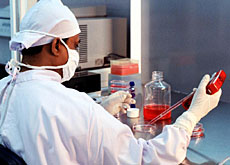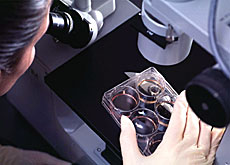Network aims to boost Swiss stem cell research

Researchers from around the country have joined forces to launch a nationwide network aimed at pushing forward stem cell research.
The Swiss Stem Cells Network (SSCN) also hopes to answer some of the ethical questions surrounding this highly emotive and often controversial issue.
The association’s launch comes six weeks ahead of a nationwide vote on whether to allow research on stem cells from surplus human embryos in Switzerland.
Stem cells can be manipulated to develop into any type of human cell, and could potentially be used to grow new organs to replace damaged ones.
“Our goal is to gather all of the resources available in Switzerland in an effort to enhance communication, develop new strategies, build international links and train young students,” said the head of the SSCN, Ariel Ruiz i Altaba.
“This is a critical moment in history for conducting work on stems cells of different kinds, including adult and embryonic,” Ruiz i Altaba told swissinfo. “The possibilities are very open at this point and it would be a pity to close the door to a better future.”
Critical mass
So far, around 80 scientists and doctors from universities around the country – including Geneva, Lausanne, Basel and Zurich – have signed up to the non-profit network.
It is hoped that the association will eventually link up with similar projects in countries like Britain and France to create a European stem cell network.
“In different countries, people have been very keen on pooling resources and trying to reach a critical mass for research,” said Ruiz i Altaba. “The point is to start at a grassroots level and then establish links with international societies.”
He added that a long-term goal for the association was to foster cooperation with “centres of excellence” in the United States.
“We’re very interested in collaboration with the US but we’re fully aware that in order to achieve this, we have to become competitive,” Ruiz i Altaba said. “And in order to be competitive, we have to have something to offer.”
His comments were echoed by the SSCN’s co-founder, Brigitte Galliot, who said the group aimed to bring European researchers together on a regular basis for “high-level scientific exchange”.
“By sharing ideas and strategies, the network has the potential to tremendously help basic research and could lead to some very exciting discoveries,” Galliot told swissinfo.
Public awareness
Supporters of stem cell research, including the Swiss interior minister, Pascal Couchepin, say it offers hope for incurable illnesses such as Parkinson’s, paraplegia, diabetes and heart disease.
The government is backing a new law that would allow fertilised eggs left over from in-vitro fertilisation to be used for research purposes, but only under strict conditions (see related stories).
Meanwhile, anti-abortion groups and the Greens have opposed the legislation, arguing that adult stem cells are sufficient for research purposes.
It will be up to Swiss voters to decide whether to accept the new legislation during a nationwide referendum on November 28.
The leaders of the SSCN say they hope to use the association’s website to help educate the public about the medical, biological and ethical issues at stake.
“This is a complex issue and it will be a major setback if the new legislation is rejected… but I fully endorse an open vote,” said Ruiz i Altaba.
“People have the right to decide, but they also have the right to be informed and so one of our goals is to be transparent about this issue and to let people know that they can ask us questions,” he added.
swissinfo, Anna Nelson in Geneva
Stem cells are cells that renew themselves for long periods through cell division.
Under certain conditions, they can be induced to become cells with special functions such as the beating cells of the heart muscle or the insulin-producing cells of the pancreas.
It is thought that stem cells may, in the future, become the basis for treating diseases such as Parkinson’s disease, diabetes, and heart disease.
The Swiss Stem Cells Network (SSCN) was launched in Geneva this week and aims to boost scientific and medical research in Switzerland.
The group of around 80 scientists, doctors and researchers also hopes to educate the public about the medical, ethical and biological issues involving stem cells.
It is a non-profit association funded by the Fondation Louis-Jeantet, the National Center of Competence in Research and the Universities of Geneva and Lausanne, as well as the Federal Institute of Technology in Lausanne.

In compliance with the JTI standards
More: SWI swissinfo.ch certified by the Journalism Trust Initiative











You can find an overview of ongoing debates with our journalists here . Please join us!
If you want to start a conversation about a topic raised in this article or want to report factual errors, email us at english@swissinfo.ch.